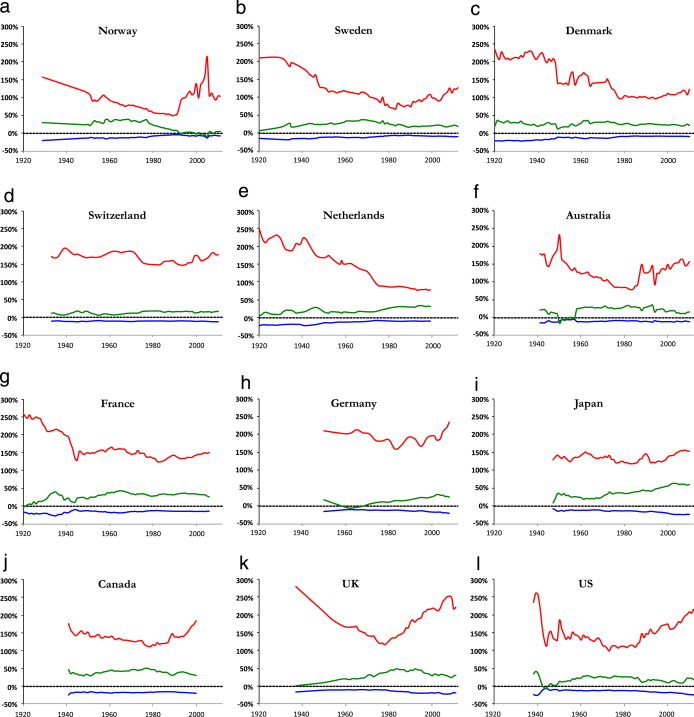Read today
What’s fair?: New theory on income inequality
Excerpts:
Columbia Engineering Professor Venkat Venkatasubramanian has led a study that examines income inequality through a new approach: he proposes that the fairest inequality of income is a lognormal distribution.
“This unified framework of game theory and statistical mechanics, which I call statistical teleodynamics, offers us new insights about both disciplines and answers some long-standing open questions in economics and game theory,”

Figure: Global income inequality trends over the years: Blue lines: bottom 90%; green lines: top 10%-1%; red lines: top 1%; black dashed lines: 0% ideal reference. (Original)
As you can see, Scandinavian countries have been getting better while the US and the UK have been getting worse.
I Fooled Millions Into Thinking Chocolate Helps Weight Loss
Excerpts:
They wanted me to help demonstrate just how easy it is to turn bad science into the big headlines behind diet fads. And Onneken wanted to do it gonzo style: Reveal the corruption of the diet research-media complex by taking part.
Dropping the ball on experimental procedure:
If you measure a large number of things about a small number of people, you are almost guaranteed to get a “statistically significant” result. Our study included 18 different measurements—weight, cholesterol, sodium, blood protein levels, sleep quality, well-being, etc.—from 15 people. (One subject was dropped.) That study design is a recipe for false positives.
Dropping the ball on peer review:
Although the [journal] editor claims that “all articles submitted to the journal are reviewed in a rigorous way,” our paper was published less than 2 weeks after Onneken’s credit card was charged. Not a single word was changed.
Dropping the ball on journalism:
Almost no [reporter] asked how many subjects we tested, and no one reported that number. Not a single reporter seems to have contacted an outside researcher. None are quoted.
Here is the original prcess release.
Being a Better Online Reader
…architects who wrote to her about students who relied so heavily on ready digital information that they were unprepared to address basic problems onsite. There were the neurosurgeons who worried about the “cut-and-paste chart mentality” that their students exhibited, missing crucial details because they failed to delve deeply enough into any one case…
She fears that as we turn to digital formats, we may see a negative effect on the process that she calls deep reading. Deep reading isn’t how we approach looking for news or information, or trying to get the gist of something. It’s the “sophisticated comprehension processes,” as Wolf calls it, that those young architects and doctors were missing. “Reading is a bridge to thought,” she says. “And it’s that process that I think is the real endangered aspect of reading. In the young, what happens to the formation of the complete reading circuitry? Will it be short-circuited and have less time to develop the deep-reading processes? And in already developed readers like you and me, will those processes atrophy?”
Sadly, I read this article in exactly the way it describes.